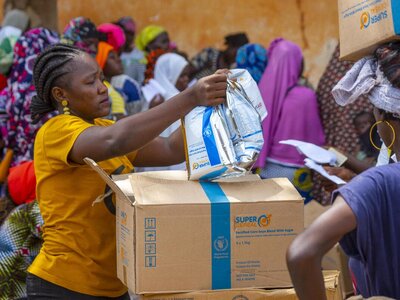Emergency relief
- 103 million
- people reached by WFP through emergency assistance in 2023
- 19 million
- women and children supported by WFP malnutrition prevention and treatment programmes in 15 emergencies in 2023
- 24 hours
- was average time for WFP to reach people with emergency support in 47 crises in 2023
Emergencies are described as “urgent situations in which there is clear evidence that an event, or series of events, has occurred which causes human suffering or imminently threatens lives or livelihoods, and which the government concerned has not the means to remedy; and it is a demonstrably abnormal event, or series of events, which produces dislocation in the life of a community on an exceptional scale.”
For more than 60 years, the World Food Programme (WFP) has provided emergency food assistance, often in conflict, post-conflict or disaster situations.
To this day, we continue to assist millions of people displaced, rendered homeless or deprived of basic resources by cataclysmic events, whether man-made or natural, avoidable or not. Through decades of crises and countless interventions, we have developed a unique body of expertise in addressing emergencies. This applies both to programming – the set of policies and concepts that guide our action – and to the mechanisms of preparedness and response.






